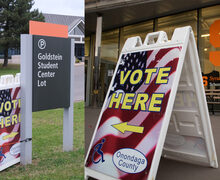Decaffeinated: The Church of Jesus Christ of Latter-day Saints allows drinking of soda, but BYU upholds ban
Elizabeth Latella | Contributing Illustrator
The Church of Jesus Christ of Latter-day Saints’ recent blog post contradicted what was formerly considered a rule when it said it is not necessary to avoid drinking caffeinated beverages.
Despite the change, Brigham Young University Provo’s policy of not selling caffeinated drinks on campus is still in effect, The Universe, BYU’s student newspaper, reported on Sept. 11.
Members of university administration claim the absence of soda vendors is partly due to a lack of popular demand, The Universe reported.
“I have met with students who would like to see a change in our soda policy and with those who support our current position,” said Dean Wright, the director of Dining Services at BYU, in an email.
More than a thousand individuals signed a petition to get Coca-Cola and Pepsi products on campus, and hundreds liked the accompanying Facebook page, “BYU for Caffeine,” within days of the church’s blog post, according to the article.
Currently, the petition still needs 476 signatures before it can be presented to the university, according to Change.org, which hosts the petition.
BYU students staged a protest at Brigham Square, handing out about 50 cans of free soda in three minutes before cops appeared on the scene and asked them to move off campus property. The demonstration was meant to disprove the notion that there was no demand for caffeinated drinks on campus, The Universe reported on Sept. 14.
A banner on the Facebook page reads, “We are the demand.”
“This has not been an issue to this point,” said Carri Jenkins, assistant to the president and spokeswoman on matters of university policy.
Jenkins said while BYU tries to assess the current needs and desires of its students, they are welcome to bring soda from local stores onto campus.
“Students can decide for himself or herself whether to drink soda or not,” Jenkins said. “It is always an individual choice.”
In regard to the current issue of allowing BYU Dining Services to provide caffeinated drinks, Jenkins said “there is no time frame” for making a decision. Both Jenkins and Wright said they are more concerned with feeding 30,000 mouths a day and preparing for upcoming events, such as homecoming and football games, than polling students to gauge public opinion at this time.
“Because we are in a very busy time right now, our focus is on providing quality service,” Wright said. “As we have done in the past, we will continue to assess the needs of our guests.”
Dining Services has accommodated students’ desires for soda in light of proper Mormon health practices since it was established in 1952. When sodas first became popular, the university made concessions by providing non-caffeinated sodas, Wright said.
Regardless of what steps the university takes, Wright said, it will continue to “nourish the campus community in a spirit of hospitality” and educate students on the dietary value of provided meals.
“Our vision is culinary excellence based on wellness, service and sustainability,” Wright said. “As a department we have made great strides in helping our guests understand the nutritional values of the foods we offer.”
Published on September 27, 2012 at 12:59 am
Contact Andrew: asmuckel@syr.edu





